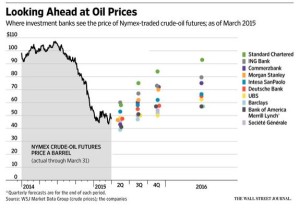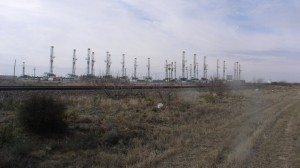Our firm will host a seminar in Austin for land and mineral owners on May 8. Open to the public, but you have to register. You can register here.
Articles Posted in Uncategorized
Major Banks’ Oil Price Predictions
A Picture Says a Thousand Words
Great New Website from Energy Information Administration Explains Energy in Layman’s Terms
The U.S. Energy Information Administration has launched a new website that contains wonderful information about energy described in terms laypersons can understand. It can be found at http://tonto/eia.doe.gov/energyexplained/ . Here are some examples of information you can find there:
— A British Thermal Unit (Btu) is the quantity of heat required to raise the temperature of one pount of liquid water by 1 degree Farenheit at the temperature that water has its greatest density (approximately 39 degrees F.).
— One Btu is about the amount of energy burned by a common kitchen match. One million Btu equals about 8 gallons of gasoline. One billion Btu eqals all the electricity that 300 households consume in one month.
Gas Measurement 101
A barrel of oil is a barrel of oil, but how much is an mcf of gas? Herein some basic facts about natural gas composition and measurement.
The first thing to remember: natural gas is measured by volume (cubic feet) but is sold based on its heating content (Btus).
Environmental Groups Divided Over Support of Waxman-Markey Bill
Environmental groups are debating whether to support the bill recently passed by the U.S. House of Representatives as the American Clean Energy and Security Act, in its present form. Principal criticisms are that it strips away some of the Clean Air Act authority to reduce coal pollution in new coal-fired power plants, it grants too muich money to carbon capture and sequestration projects, and its goals for near-term carbon dioxide emission reduction are too weak. Moveon.org has asked its members to vote on whether to support the bill in its current form.
A good summary of arguments pro and con can be found at the Yale Environment 360 website.
Meanwhile, even the Texas Legislature appears to have jumped on the renewable energy bandwagon. It passed two bills to encourage use of alternative fuels in fleet vehicles. Senate Bill 1759 creates a Clean Fleet Program that provides grants to fleet owners to replace their diesel vehicles with alternative-fuel vehicles. House Bill 432 amends the State’s Fleet Alternative Fuel Program to require that 50% of the state’s 27,000 fleet vehicles use clean alternative fuels 80% of the time, a requirement that will be phased in as state fleet vehicles come up for replacement. Law enforcement and emergency vehicles are exempt, and exemptions can be granted if the agency shows that it is not cost-effective to meet the requirements.
 Oil and Gas Lawyer Blog
Oil and Gas Lawyer Blog




